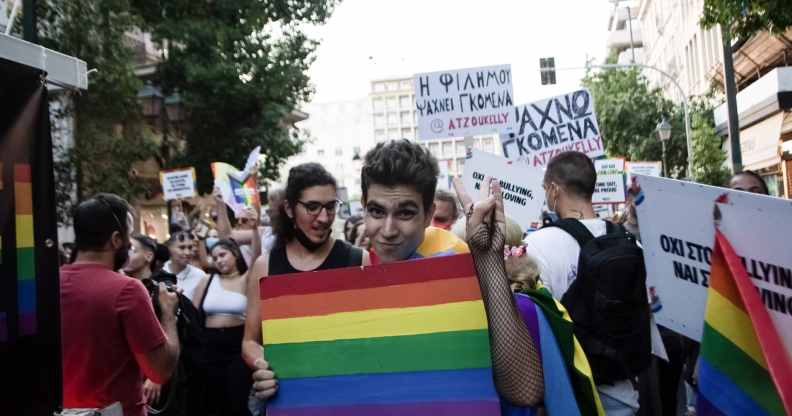Greece finally lifts archaic ban on queer men donating blood: ‘It’s the least they could do’

(Nikolas Kokovlis/NurPhoto via Getty Images)
Greece has lifted its stringent, decades-old ban on gay and bisexual men donating blood in a move dubbed by activists as “the least [they] could do”.
Health officials brought out a life-long ban on men who have had sex with another man at any point donating blood in 1977, in line with international regulatory authorities of the time.
But on Monday (10 January), health minister Thanos Plevris and deputy Mina Gaga signed a ministerial decree to remove such restrictions, Greek City Times reported.
Current criteria debarring someone from donating blood will no longer include homosexuality.
The change will come into effect once published in the Government Gazette, Greece’s legal newspaper that prints the text of new laws and decrees.
Queer men in Greece no longer need to ‘pretend they’re straight’ to donate blood
It comes after Kyriakos Mitsotakis’ centre-right government requested a review of the outright ban last year, with Plevris calling on blood transfusion officials to review the rules that no longer “meet current medical data”.
Activists in Greece have fought for years for a new blood donation policy, furiously arguing that such restrictions are deeply stigmatising and are a haunting hang-up of AIDS hysteria.
Science has, it’s safe to say, advanced since the 1980s, when HIV testing was slower and clunkier. Now many leading health authorities have acknowledged that a lifetime ban does not keep pace with the current understanding of HIV.

Greece’s former and current health ministers, Makis Voridis (C) and Thanos Plevris (R). (NurPhoto/NurPhoto via Getty Images)
For years, health officials and academics have sounded the alarm over the “crisis” seizing Greece‘s plummeting blood donation rates, one compounded by the coronavirus and the wily Omicron variant.
The National Center for Blood Donation, otherwise known as the EKEA, has warned of the years-long downward trend in blood supply in 2015, with the agency even pleading for volunteers to not “forget to donate blood” themselves.
The shift puts Greece on par with many other European countries, including Britain, France and Hungary as well as the US which have eased or done away altogether their homophobic blood bans.
But to activists, all the Greek government has done is the bare minimum.
“Lifting this long-lasting ban on blood donation was the least this government had to do,” Irene Petropoulou, chairperson of ΟΛΚΕ, a non-governmental organisation that fights for LGBT+ rights, told PinkNews.
“Of course, it is great news, and we hope the government will pay more attention to other discriminations in the healthcare system and in education.
“Gay and bisexual men are free now to give blood without pretending they are straight men.”

